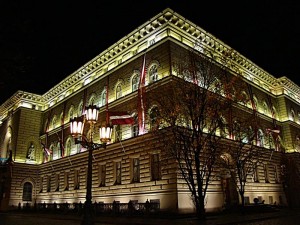
The evening Cabinet meetings will continue until the budget is completed. The finance ministry told Baltic Reports that the goal was to finalize the budget in October. Photo by Melnā Pantera.
RIGA — During today’s emergency Cabinet meeting the Latvian government made a few agreements but still left much of the 2010 budget unsettled.
The Latvian government agreed to fully maintain funding for health care but cut by six percent for law enforcement and teachers and a 20 percent reduction in public administration, defense, culture and environmental protection.
The next meeting will be held Thursday. It is a closed session.
Budget emergency
Following a marathon emergency meeting on Saturday Latvia’s government announced plans to cut the 2010 budget by 275 million lats in order to achieve total savings of 500 million, as agreed with the International Monetary Fund and the European Commission.
Prime Minister Valdis Dombrovskis said the measures will secure the required 8.5 percent budget deficit of gross domestic product.
The government aims to glean an additional 49 million lats by widening the personal income tax base.
However, government plans for a real estate tax were recently squashed after the People’s Party, the largest of five coalition partners, voted in parliament against the proposal.
As a result this previously planned source of income will now be replaced by further budget cuts.
The actual sum of expenditure cuts needed to meet the budget target remains contested within the government.
Finance Minister Einars Repše maintains expenditures should be slashed by a whopping 410 million lats if the government is to succeed in achieving a budget decrease of 500 million lats.
In an interview with the Diena newspaper yesterday President of the Bank of Latvia Ilmārs Rimšēvičs said the government’s budget plan strayed from its obligations to international lenders and could ultimately lead Latvia into default.
He warned such moves pose a threat to Latvia’s international standing, and could trigger a hike in interest rates and decrease volume of investments.
Latvia faces an 18 percent drop in GDP this year and a forecast 4 percent fall in 2010.
It remains largely dependent on funds from a 7.5 billion euro rescue package from the IMF and other lenders last December to stabilize its ailing economy.
In exchange the Latvian government agreed to implement a raft of tough budget and structural reforms.
The IMF also insisted on a budget deficit of below 5 percent of GDP in 2009 to be reduced to 3 percent in 2010.
In March the IMF withheld an emergency payment of nearly 200 million after the then Latvian government failed to implement promised reforms.
In August, after months of wrangling, the IMF agreed to pay out a second loan tranche of 195 million after agreeing to lift the 2009 deficit target from 5 percent to 13 percent of GDP in exchange for credible economic policy reform.
An IMF mission is due to visit Latvia in late October or November. The government hopes to finalize the budget before then.
— Baltic Reports editor Nathan Greenhalgh contributed to this article.












